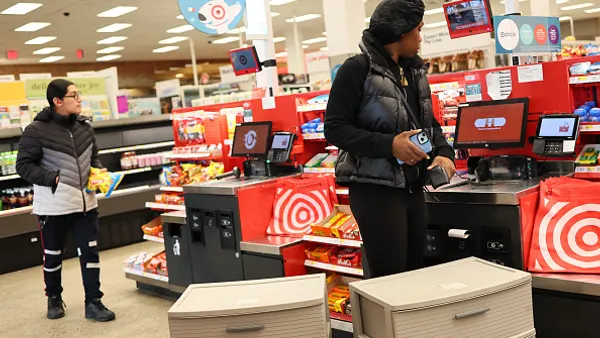As COVID-19 has disrupted business around the globe, hourly workers on the frontlines have been among those most impacted, which can lead to an increase in financial stress. In fact, even prior to COVID-19, 44% of surveyed U.S. workers had less than $500 dollars saved for unexpected expenses.¹
In an effort to help alleviate this stress, employers may begin to turn to benefits like Earned Wage Access (EWA), a solution that allows hourly workers to have access to their already-earned wages in between the regular pay cycle, giving them greater financial flexibility and promoting peace of mind. EWA enables employees to tap into their wages in real-time, so they can pay for essentials as they need them.
Employers are also benefiting from EWA, as the service provides new opportunities to promote overall employee financial wellness, engagement, recruitment and retention.
Today, Visa is working with leading EWA providers and their financial institutions to help enable real-time² access to funds for hourly workers through Visa Direct, Visa’s real-time push payments platform. Workers whose employers offer EWA services can download an app from their employer’s EWA provider to access and transfer a portion of earned wages to their eligible Visa card linked bank account between pay cycles.
Demand for faster access to pay has gone up with the emergence of COVID-19. Visa Direct transactions for workers seeking earned wage access or on demand pay across supermarket, quick service restaurants, healthcare and hospitality industries, have increased more than 100% year over year.³
“Put yourself in the shoes of the hourly employee,” says Cecilia Frew, SVP, Visa Direct. “If an employer can offer to pay you faster, allowing you to get the money you’ve earned in real-time through an app on your phone, imagine what that does to your ability to control your financial future, and to your relationship with your employer—who is now really empowering your financial journey.”
Dealing with Distraction
The reality of finances for hourly U.S. employees can be difficult, and cause distractions and stress on the job. Prior to the pandemic, 84% of workers surveyed spent time thinking about or dealing with finances at work, and 34% spent four or more hours each week thinking about personal finances at work.⁴
Simply put, financial concerns consume a lot of hourly employees’ time and energy, a challenge that EWA can help address.
“Back in the old days, if you wanted to process payroll daily, it was a ton of work and even then, there’d be a lag time of a week that would make the process too complex to be worthwhile,” says Frew. “Today, all of the advancements of payment technology have come to a head to make providing the benefit of Earned Wage Access an incredibly simple and fast process. You can empower employees to receive pay with the click of a button and they’ll see that transaction happen in real-time.”
Benefiting Employees and Employers
Here are some of the potential benefits motivating companies to implement EWA for hourly talent:
Improved Financial Wellness for Employees
One aspect of financial wellness is how much control a person has over their money and overall financial situation. EWA gives hourly employees real-time access to their earned income, allowing them to take care of necessary expenses such as groceries, bills, gas, and personal care products. This may help hourly workers avoid reliance on payday loans that often step in to fill in the gaps between paychecks.
Beyond the upfront benefit of improving cash flow, some EWA service providers also offer built-in financial wellness resources that can prove incredibly helpful for hourly workers.
“Now that employers can reach employees digitally, they have the opportunity to provide valuable knowledge about financial health and wellness,” says Frew. “An EWA partner can plug employees into an ecosystem of financial wellness, which includes savings tools, prepaid cards for budgeting, and more.”
Enhanced Employee Engagement and Productivity
Having access to earned wages in real-time can also increase employee engagement and productivity, as hourly workers may feel more connected to the work they’re doing when they have more control over when they are paid.
EWA can be especially helpful for employers that struggle to get volunteers for undesirable shifts, like the night shift in a hospital or early hours in a grocery or retail setting. One healthcare provider found that by introducing EWA, hourly employees were quicker to volunteer for less desirable shifts, knowing they would be able to access their wages sooner.
“EWA apps allow employers to say, ‘Here’s what you’ve earned, and here’s the amount you can pull out,’” says Frew. “Not in two weeks, not in one week, but right now.”
Lower Employee Turnover and Higher Retention
EWA also has the potential to improve retention rates. In fact, 89% of surveyed workers said they would be willing to work longer for an employer that offered EWA, and 79% would be more willing to switch to an employer already offering it.⁵
Progress in Payroll
Today, innovative real-time payment solutions put money in the hands of hourly workers quicker, helping employees manage short-term cash flow needs. EWA helps support financial wellness for employees, and better engagement and retention for employers—a true win-win scenario amid today’s vast economic disruption. Visa’s strong commitment to helping power fast access to wages in partnership with leaders in the EWA space, can help improve hourly workers’ access to earned wages between pay cycles during these unpredictable and challenging times.
Sources:
- Earned Wage Access Preferences Survey (April 2019). Commissioned by Visa and conducted by AYTM among 1,000 workers across varying industries in the United States.
- Actual fund availability depends on receiving financial institution and region.
- Visa Q2 2020 Earnings Transcript
- Earned Wage Access Preferences Survey (April 2019). Commissioned by Visa and conducted by AYTM among 1,000 workers across varying industries in the United States.
- Earned Wage Access Preferences Survey (April 2019). Commissioned by Visa and conducted by AYTM among 1,000 workers across varying industries in the United States.










